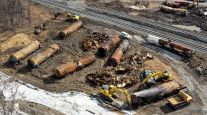Senior Reporter
House Transportation Leader Advocates for FEMA Mitigation Bill

[Stay on top of transportation news: Get TTNews in your inbox.]
Legislation designed to facilitate recovery efforts for communities and commercial corridors hard-hit by natural disasters is ready for debate before the U.S. House of Representatives, the chamber’s top transportation policymaker said recently.
Rep. Peter DeFazio (D-Ore.), chairman of the House Transportation and Infrastructure Committee, pressed colleagues to debate the Resilient Assistance for Mitigation for Environmentally Resilient Infrastructure and Construction by Americans (AMERICA) Act.
The legislation, designed to enhance mitigation and resilience provisions during post-natural disaster recovery efforts, awaits consideration before the full chamber. Democratic leaders have yet to schedule a vote on the bill.
“The increasing frequency, intensity and cost of natural disasters makes us ask — what can we do to protect communities before disaster strikes? The answer is to invest in mitigation efforts,” DeFazio said during a hearing Feb. 16. “Time and again we’ve discussed mitigation as a common-sense, cost-effective way to save lives and property. That’s why I strongly support finding ways to expand funding for mitigation projects.”
Specific to the Resilient AMERICA measure, the chairman added, “We successfully advanced this bill out of committee, and I look forward to the opportunity to debate it on the House floor. The improvements to hazard mitigation assistance programs that this legislation provides will help individuals and communities make needed investments in mitigation efforts.”

Titus
DeFazio’s colleague, Rep. Dina Titus (D-Nev.), chairwoman of the Economic Development, Public Buildings and Emergency Management Subcommittee, emphasized: “A consistent thread connecting FEMA’s challenges is the increasing severity and cost of disasters.”
“Mitigation projects must be used to reduce the impact of such incidents and build resilience. That is why I am proud to have championed expanded mitigation efforts as chair of this subcommittee, including our bipartisan Resilient AMERICA package,” she continued.
Last fall, the transportation panel gave bipartisan approval to the legislation. Specifically, the bill aims to enhance a post-disaster hazard mitigation grant program. Under the jurisdiction of the Federal Emergency Management Agency, the program is meant to promote the safety of individuals as well as communities, and enhance an infrastructure’s ability to withstand and recover from severe weather events.
“Hazard mitigation is any sustainable action that reduces or eliminates long-term risk to people and property from future disasters,” according to FEMA. “Mitigation planning breaks the cycle of disaster damage, reconstruction and repeated damage. Hazard mitigation includes long-term solutions that reduce the impact of disasters in the future.”
Want more news? Listen to today's daily briefing above or go here for more info
The agency also is tasked with pursuing hazard mitigation efforts through its Building Resilient Infrastructure and Communities (BRIC) grants. Established in 2018 via enactment of the Disaster Recovery Reform Act, BRIC grants incentivize innovative infrastructure projects to ensure their capability for withstanding the impact of severe weather events.
Relatedly, on the Senate side, the Small Business and Entrepreneurship committee recently approved legislation that would authorize the Small Business Administration to declare a disaster in rural areas in the event of significant damage. The bill specifically would amend the Small Business Administration’s threshold for disaster declarations. Doing so would authorize the agency’s administrator to issue a disaster declaration for rural communities included in a presidential public assistance-only disaster declaration if the state governor has requested the declaration.
The measure’s sponsors include Sens. Jim Risch (R-Idaho), Jeanne Shaheen (D-N.H.), Maggie Hassan (D-N.H.), John Kennedy (R-La.) and Mike Braun (R-Ind.).
Committee Chairman Ben Cardin (D-Md.) observed: “The bill will ensure that rural communities receive the support they need following a natural disaster by directly addressing current situations in which a rural community is significantly impacted by a natural disaster, but does not reach SBA’s threshold for a disaster declaration.”


